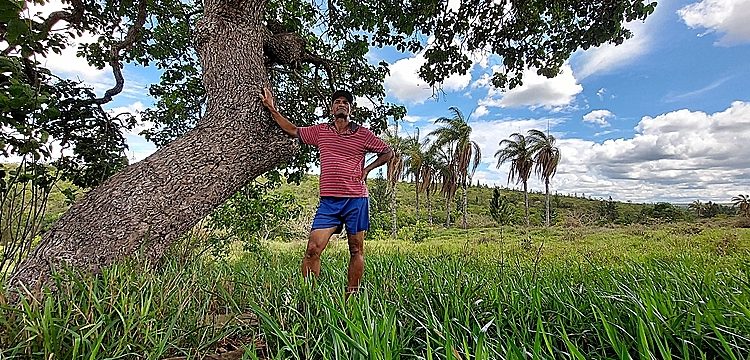Driving for almost two hours, all you see is eucalyptus. An infinity of eucalypti, because there is no beginning nor end, making big people look small. The plantations have existed in Vale das Cancelas, in the north of Minas Gerais, since the mid-1970s, when the federal government implemented programs to encourage monoculture in the area.
It so happens that the region is also home to 73 traditionalist farming communities that have been there for at least 150 years, between the municipalities of Grão Mogol, Padre Carvalho and Josenópolis.
54 year old José Maria Gonçalves, one of the five remaining children of matriarch Vicença Maria de Jesus, now 100 years old, says that his mother "has already started a fight with everyone who claimed to be the boss here". "I'm going to die with my nose in this ground, this land here you don't take from me", said Dona Vicença, who hails from the Buriti Pequeno community.
Gonçalves says that before the expansion of eucalyptus farms in the region, life was better. “We had fruits to eat at will, and animals too. Here comes this eucalyptus plantation that leaves nothing inside it, because the eucalyptus itself kills the fruit trees, and the water has been drying up”, he reports.
There were neighbors in every corner. Come the weekend, people visited each other, raised cattle together, helped one another. “It was all loose, that pleasant experience. Then used to take a glass and get milk straight from the cow. Think of tasty milk. The fruits were so delicious”, laments José Maria Gonçalves, Dona Vicença’s youngest son.
Eucalyptus and large scale landowners
Since the 1970s, through leasing contracts, more than 500 thousand hectares of unoccupied land have been handed over to companies and many other land grabbers.
On the other hand, the traditional population of the Gerais, the geraizeiros, have increasingly been loosing their land rights.
The expansion of monoculture has already cut about 50% of the native Cerrado (semi-arid highlands) vegetation, an ecosystem that is present in all regions of Brazil, and the most under threat since the 1970s, making up 24% of the national territory.
Among at least seven eucalyptus and pine planting companies operating in the region, there is Rio Rancho Agropecuária S / A, which belongs to Newton Cardoso, who was governor of Minas Gerais between 1987 and 1991, vice-governor of the state during the Itamar Franco government and Federal Congressman for three terms, representing the center-right MDB party.
Newton Cardoso and his son, Newton Cardoso Júnior, are among the names mentioned in documents related to one of the biggest corruption leaks in history, known as the Panama Papers, because of the purchase of a helicopter in 2007, through an offshore company in the United States. The Federal Supreme Court (STF) also investigates alleged financial crimes, such as money laundering and concealment of assets at the Rio Rancho company. Contacted by Brasil de Fato, they did not respond until the publication of this article.
Irregularities in the operating license of the Rio Rancho company have been mapped over the years, a period when many coal production projects were taking place. Public entities have already notified the company of changes and new conditions in the process of renewing their environmental license, however, according to the company, the implementation of these is stalled due to the covid-19 pandemic.
The geraizeros
Gerizeiros have been formally recognized as a traditionalist people since 2018. With the recognition, it was possible to start the process of land regularization, as prescribed by law. However so far, the process has not been finalized. Although they have the right to be heard in the environmental licensing processes of companies in the region, their rights are not respected.
According to José Maria Gonçalves when the eucalyptus companies arrived, they promised to bring schools and grocery stores to the population, but to this day, they “only see destruction”.
In the same vein, Sandra Helena Gonçalves Costa states that the much-promised development stemming from the federal government's programs appeared in the form of “misery, land grabbing, depletion of water bodies, deforestation, reduction of biodiversity, diseases and contamination from pesticides”.
Today, the main sources of income for the 73 communities are Social Security benefits, such as retirement, emergency aid and Continuing Benefits (BPC), as well as wealth distribution programs such as Bolsa Família.
In addition, jobs are generally low-paying, ranging from one to two minimum wages. One of these workers is Lindomar Siqueira Nunes, 27, who works on a monoculture eucalyptus farm planting seedlings, from Monday to Saturday, for eight hours a day, for the minimum wage of U$ 200 per month. With tax deductions, Nunes ends up getting an average of R $180.

Lindomar and José Francisco work the fields together when the young man isn't working at the eucalyptus farm / Caroline Oliveira
“We end up doing this due to lack of options. It is what it is, so we have to do it at anyway. But it pays very little, demands a lot from us, a lot of effort. Everyday, I walk an average of about 15 kilometers, on foot, planting. I'm broken. This leg is all broken”, he points out.
Life in the Gerais that used to be good has become increasingly difficult. But, without the little they have – from which they are able to produce a lot – the situation worsen, according to 48-year-old breeder Martim Inácio Ferreira. “They want to takes from here, but there's no way. If I leave here, where am I going to live?”.
The geraizeiros have rough hands, marked by the land. The calluses do not lie, let alone the gardens. In small spaces, crushed on all sides by monoculture, they produce mango, passion fruit, orange, peanuts, peppers, fennel, raise pigs, chickens, fish, grow pumpkin, beans, corn, watermelons, zucchini, gherkin and anything possible with water and space available. This is the not-too-distant future that they all hope for.




